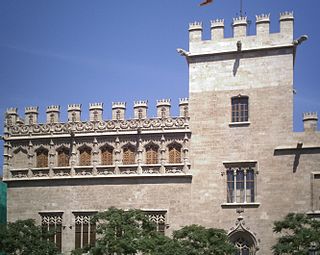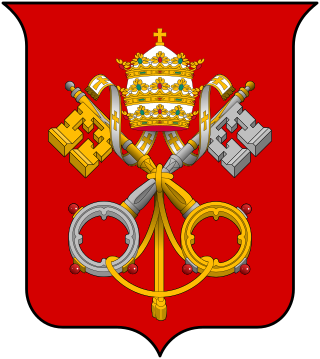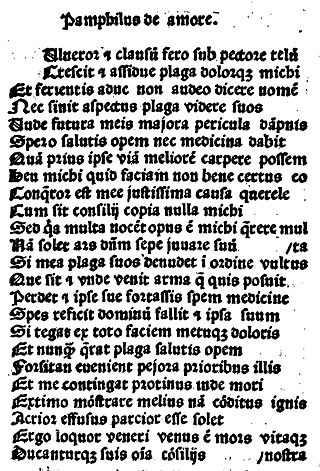John Marchesinus (called in Latin Johannes Marchesinus and in Italian Giovanni Marchesini) was an Italian Franciscan friar, probably of the late thirteenth and early fourteenth centuries, who was the author of religious works.
Little is known of Marchesinus, apart from what is said in his own work. Even the date of his life is uncertain and in the words of P. S. Allen "has been put both at 1300 and at 1466". [1]
His Mammotrectus super Bibliam , written at Reggio Emilia probably towards the end of the 13th century, was an etymological analysis of the Vulgate, the Latin Bible. There were at that time many priests who were barely literate, and Marchesinus declared himself to be "impatient with his own lack of skill, and compassionate towards the rudeness of poor clerics promoted to the office of preaching". In view of that, he wrote to "edify their understanding with etymology". [2]
In his Confessionale, compiled around 1300 and called a "little work", the first thing Marchesinus considers is the correct setting for a confession, advising that "The priest hearing confession should sit in a public and honourable place, lest, if this be wanting, he may appear to be an adulterer". [3]

Calvinism is a major branch of Protestantism that follows the theological tradition and forms of Christian practice set down by John Calvin and other Reformation-era theologians. It emphasizes the sovereignty of God and the authority of the Bible.

The Renaissance is a period in European history marking the transition from the Middle Ages to modernity and covering the 15th and 16th centuries, characterized by an effort to revive and surpass ideas and achievements of classical antiquity. It occurred after the Crisis of the Late Middle Ages and was associated with great social change. In addition to the standard periodization, proponents of a "long Renaissance" may put its beginning in the 14th century and its end in the 17th century.

The Divine Comedy is an Italian narrative poem by Dante Alighieri, begun c. 1308 and completed around 1321, shortly before the author's death. It is widely considered the pre-eminent work in Italian literature and one of the greatest works of world literature. The poem's imaginative vision of the afterlife is representative of the medieval worldview as it existed in the Western Church by the 14th century. It helped establish the Tuscan language, in which it is written, as the standardized Italian language. It is divided into three parts: Inferno, Purgatorio, and Paradiso.
Jack Straw was one of the three leaders of the Peasants' Revolt of 1381, a major event in the history of England.

William Allen, also known as Guilielmus Alanus or Gulielmus Alanus, was an English Cardinal of the Roman Catholic Church. He was an ordained priest, but was never a bishop. His main role was setting up colleges to train English missionary priests with the mission of returning secretly to England to keep Roman Catholicism alive there. Allen assisted in the planning of the Spanish Armada's attempted invasion of England in 1588. It failed badly, but if it had succeeded he would probably have been made Archbishop of Canterbury and Lord Chancellor. The Douai-Rheims Bible, a complete translation into English from Latin, was printed under Allen's orders. His activities were part of the Counter Reformation, but they led to an intense response in England and in Ireland. He advised and recommended Pope Pius V to pronounce Elizabeth I deposed. After the Pope declared her excommunicated and deposed, Elizabeth intensified the persecution of her Roman Catholic religious opponents.

The Italian Renaissance was a period in Italian history covering the 15th and 16th centuries. The period is known for the initial development of the broader Renaissance culture that spread across Western Europe and marked the transition from the Middle Ages to modernity. Proponents of a "long Renaissance" argue that it started around the year 1300 and lasted until about 1600. In some fields, a Proto-Renaissance, beginning around 1250, is typically accepted. The French word renaissance means "rebirth", and defines the period as one of cultural revival and renewed interest in Classical antiquity after the centuries during what Renaissance humanists labelled as the "Dark Ages". The Italian Renaissance historian Giorgio Vasari used the term rinascita ("rebirth") in his Lives of the Most Excellent Painters, Sculptors, and Architects in 1550, but the concept became widespread only in the 19th century, after the work of scholars such as Jules Michelet and Jacob Burckhardt.

The Catholic Church, also known as the Roman Catholic Church, is the largest Christian church, with 1.3 billion baptized Catholics worldwide as of 2019. It is among the world's oldest and largest international institutions, and has played a prominent role in the history and development of Western civilization. The church consists of 24 sui iuris churches, including the Latin Church and 23 Eastern Catholic Churches, which comprise almost 3,500 dioceses and eparchies located around the world. The pope, who is the bishop of Rome, is the chief pastor of the church. The bishopric of Rome, known as the Holy See, is the central governing authority of the church. The administrative body of the Holy See, the Roman Curia, has its principal offices in Vatican City, a small enclave of the Italian city of Rome, of which the pope is head of state.
Fabius Planciades Fulgentius was a Latin writer of late antiquity. Four extant works are commonly attributed to him, as well as a possible fifth which some scholars include in compilations with much reservation. His mythography was greatly admired and highly influential throughout much of the medieval period, but it is viewed with little favour today.

Gregory of Rimini, also called Gregorius de Arimino or Ariminensis, was one of the great scholastic philosophers and theologians of the Middle Ages. He was the first scholastic writer to unite the Oxonian and Parisian traditions in 14th-century philosophy, and his work had a lasting influence in the Late Middle Ages and Reformation. His scholastic nicknames were Doctor acutus and Doctor authenticus.

A penitential is a book or set of church rules concerning the Christian sacrament of penance, a "new manner of reconciliation with God" that was first developed by Celtic monks in Ireland in the sixth century AD. It consisted of a list of sins and the appropriate penances prescribed for them, and served as a type of manual for confessors.

Aranc is a commune in the department of Ain in the Auvergne-Rhône-Alpes region of eastern France.
Validity and liceity are concepts in the Catholic Church. Validity designates an action which produces the effects intended; an action which does not produces the effects intended is considered "invalid". Liceity designates an action which has been performed legitimately; an action which has not been performed legitimately is considered "illicit". Some actions can be illicit, but still be valid.

The Consulate of the Sea was a quasi-judicial body set up in the Crown of Aragon, later to spread throughout the Mediterranean basin, to administer maritime and commercial law. The term may also refer to a celebrated collection of maritime customs and ordinances in Catalan language, also known in English as The Customs of the Sea, compiled over the 14th and 15th centuries and published at Valencia in or before 1494.
The Sacrament of Penance is one of the seven sacraments of the Catholic Church, in which the faithful are absolved from sins committed after baptism and reconciled with the Christian community. During reconciliation mortal sins must be confessed and venial sins may be confessed for devotional reasons. According to the dogma and unchanging practice of the church, only those ordained as priests may grant absolution.

The Diocese of Rome, also called the Vicariate of Rome, is the ecclesiastical district under the direct jurisdiction of the Pope, who is Bishop of Rome and hence the supreme pontiff and head of the worldwide Catholic Church. As the Holy See, the papacy is a sovereign entity with diplomatic relations, and civil jurisdiction over the Vatican City State located geographically within Rome. The Diocese of Rome is the metropolitan diocese of the Province of Rome, an ecclesiastical province in Italy. The first bishop of Rome was Saint Peter in the first century. The incumbent since 13 March 2013 is Pope Francis.

Mammotrectus super Bibliam of John Marchesinus is a guide to understanding the text of the Bible. It is one of the most important Franciscan school texts of the later Middle Ages and was written for the education of clerics.

John Duns Scotus, commonly called Duns Scotus, was a Scottish Catholic priest and Franciscan friar, university professor, philosopher, and theologian. He is one of the four most important Christian philosopher-theologians of Western Europe in the High Middle Ages, together with Thomas Aquinas, Bonaventure, and William of Ockham.

Pamphilus de amore is a 780-line, 12th-century Latin comedic play, probably composed in France, but possibly Spain. It was "one of the most influential and important of the many pseudo-Ovidian productions concerning the 'arts of Love'" in medieval Europe, and "the most famous and influential of the medieval elegiac comedies, especially in Spain". The protagonists are Pamphilus and Galatea, with Pamphilus seeking to woo her through a procuress.
Gabriel ibn al-Qilai (in exact Arabic transcription: Jibrāyīl ibn al-Qilā'i, in Latin: Gabriel Benclaius or Barclaius, was born in 1447 in Lehfed, in the Byblos District, and died in 1516 in Cyprus. He was a Lebanese Christian religious, belonging to the Maronite Church. Al-Qilai joined the Franciscan Order in 1470 and was consecrated bishop of the Maronites in Cyprus in 1507.

Thomas of Capua, also called Tommaso di Eboli, was an Italian prelate and diplomat. He served as the archbishop-elect of Naples from 1215 until 1216 and then as a cardinal until his death. He administered the diocese of Albano between 1218 and 1222 and was the papal legate in the kingdom of Italy from November 1236 until October 1237. He was the most important of Pope Gregory IX's negotiators with the Emperor Frederick II between 1227 and 1237.